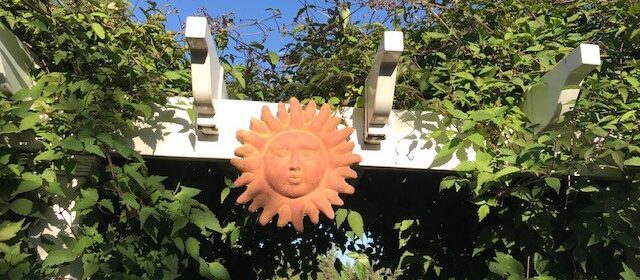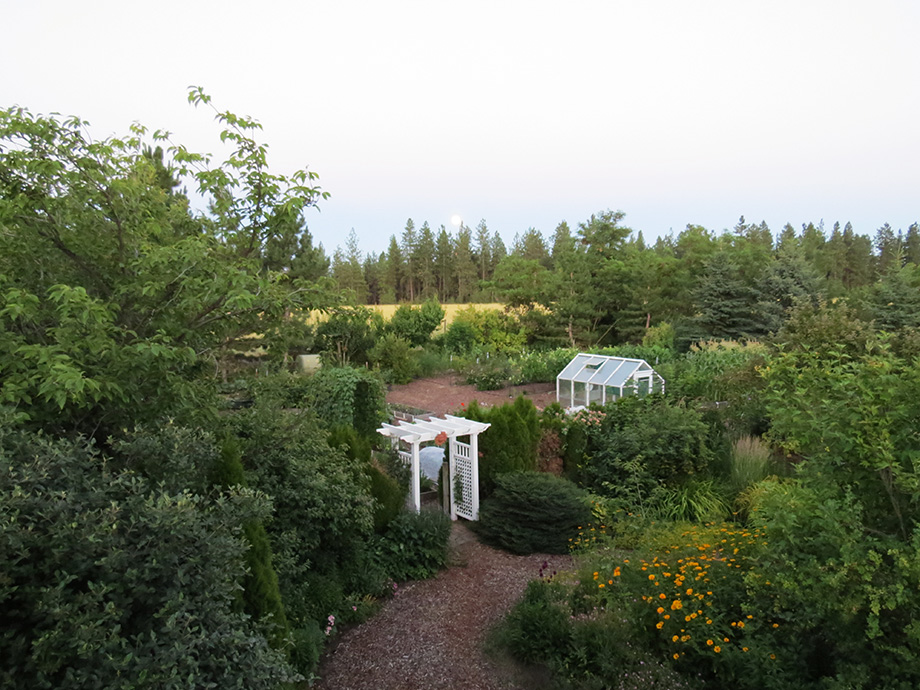Season Introduction: Column & Video

Well, today is a milestone! My first garden column, which is essentially a season introduction, is running in The Spokesman-Review newspaper here in Spokane, Wash. Here’s a link to it: Look to the past before plowing into the future. You can also read the text of my column at the bottom of this post: it won’t be as pretty as the newspaper version but it’s the text you’re after anyway, right?
I also am pairing this column with a video. So for each of them, I felt a season introduction would be in order because this might be the first time some of you have read one of my columns or will be watching one of my videos.
I know all of us gardeners are excited that the 2021 growing season is getting under way and we’re all busy making plans. You’ll notice that my column includes a list of the vegetable plants I’ll be growing this year. I don’t have many seeds started indoors yet — just onions, leeks and lettuce — but things should begin in earnest shortly.
In my video, I included a slideshow of photos showing the various aspects of our landscape so you can get your bearings for future videos:
And here is the text of my column. I hope you’ll enjoy it!
by Susan Mulvihill
FOR THE SPOKESMAN-REVIEW
A new beginning: that’s what every gardener gets when a growing season starts. We have the opportunity to try new things, avoid repeating mistakes, and the chance to share what we’ve learned – or harvested – with others.
In 2020, many people took up vegetable gardening for the first time. That was probably the only positive aspect of the pandemic but it’s my hope that every new gardener plans to grow some of their own food again this year.
Whether you consider yourself a beginner or have many growing seasons under your belt, it’s important to reflect on how last year’s garden performed. Perhaps you had trouble keeping up with it, your plants struggled because they didn’t have enough room, or you didn’t realize our very wet spring could impact the growth of your veggies.
How did you manage with your garden last year? Was it too big, too small, or just right? Keep that in mind while putting together your plant list. If you grew more than you could keep up with last year, pare down your list so you’ll have better success. Some of the most rewarding veggies to grow are zucchinis, tomatoes, corn, onions, beans, lettuce and peas. Plant what you love the most, take good care of them through the season, and you’ll eat well.
The Inland Northwest is in USDA hardiness zone 6, which means our weather can be challenging. It’s important to plant at the appropriate times while looking out for unseasonal weather and having a game plan if that happens.
Our last frost is usually in mid-May and the first fall frosts arrive sometime between mid- and late September. I typically plant cool-season crops – lettuce, beets, carrots, onions, peas, potatoes, Swiss chard and turnips, for example – between about April 7 and May 1. I start the majority of my warm-season crops – such as eggplants, melons, peppers, tomatoes and winter squash – indoors and transplant them into the garden between the middle and end of May, depending on how the forecast looks.
One lesson I learned last spring was that just because the calendar indicated it was time to plant warm-season veggies, that didn’t necessarily mean the weather conditions were right for them. They got off to a very soggy, cool start and weren’t happy about that one bit.
Gardeners love to be the first person on the block to plant their tomatoes – and, more importantly, harvest the first ripe tomato – but that can backfire on us at times. I’m sure you’re anxious to start preparing your garden but try to be patient. Working with your soil while it’s cold and wet will damage its structure (ask me how I know this). It’s better to wait until the soil is dry and crumbly.
In addition, it’s common to feel overwhelmed this time of year but avoid the temptation of doing all of your clean-up and catch-up projects in one or two days. For example, if you do some marathon pruning sessions, you’ll set yourself up for repetitive-motion injuries that take a long time to heal. It’s best to make a list and gradually work your way through them in small doses. What’s more, if you mix up the types of tasks on your list, your body will thank you for it. Remember that in addition to harvesting tasty produce, we grow a garden for fun so don’t beat yourself up.
I’m here to help answer your gardening questions but remember that your local Master Gardener program offers research-based information to help you excel. Refer to the information box for ways to contact them. Their walk-in plant clinics are temporarily closed but volunteers will still answer your calls and emails.
In keeping with my annual tradition, I’ve included a list of what I’ll be growing this year. May the 2021 garden season be a bountiful one.
Susan Mulvihill is author of “The Vegetable Garden Pest Handbook.” She can be reached at Susan@susansinthegarden.com. Watch this week’s “Everyone Can Grow a Garden” video at youtube.com/susansinthegarden.
[INFORMATION BOX]2021 Mulvihill Garden
Artichoke: Tavor
Basil: Italian Large Leaf
Bean, pole: Musica
Beets: Cynlindra
Broccoli: Early Dividend
Carrot: Danvers 126, Kuroda, Tonda di Parigi, Uzbek Golden
Celery: Tango
Chard: Ruby
Corn: Sweetness Bicolor
Cucumber: Lunchbox
Leek: Bulgarian Giant
Lettuce: Bronze Beauty, Buttercrunch, Little Gem, Red Wing lettuce mix
Melon: Tuscan Napoli
Onion: Italian Red of Florence, Stuttgarter
Pea: Green Arrow
Pepper: Early Jalapeno, Marconi Rosso, Serrano
Pumpkin: New England Pie
Sorrel: Green de Bellville
Squash, summer: Cocozelle
Squash, winter: Autumn Frost, Butternut, Cushaw, Potimarron
Tomato: Chef’s Choice Orange, Federle, Gilbertie
Turnip: Silky Sweet
[INFORMATION BOX]Get Help with Gardening Questions
Spokane County Master Gardeners: Call (509) 477-2181, email mgardener@spokanecounty.org or submit a question online at extension.wsu.edu/spokane/master-gardener-program/plant-clinic/.
Kootenai County Master Gardeners: Send an email to volunteerimg@uidaho.edu or submit a question online at uidaho.edu/extension/county/kootenai/garden/clinic.
[INFORMATION BOX]Spring Gardening Classes
The Spokane County Master Gardener program has scheduled virtual classes on a wide range of gardening topics. To view the lineup, go to https://extension.wsu.edu/spokane/.

